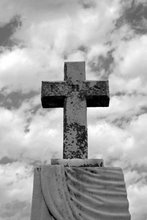I love what they do over at the Brevity blog. Well, I love everything that Brevity does. But specifically, every so often they invite a writer to explain “the story behind a story” that has appeared in Brevity.
I thought I would attempt an explanation for “Dad Digs Uncle Davey’s Grave,” the story that received an honorable mention in the Writer’s Digest 2008 competition and will appear in the Spring 2009 issue of The Truth About the Fact.
My dad was a gravedigger in small-town Minnesota. He approached his job matter-of-factly. He’d come home after digging and empty the pockets of his dark blue uniform. Spare change, matches, and cigarettes piled on top of the refrigerator. He’d shower, change into slacks and a t-shirt, or, if he was going out for coffee with the guys, a short-sleeved polo or dress shirt.
Dad was a lighthearted, talkative guy who liked to laugh. He didn’t dwell on his job even though we lived in a small town, which meant he buried neighbors, kids of acquaintances, and distant relatives on a regular basis. He buried the old (heart attacks, cancer) and the young (car accidents, suicide). He had a job to do, and he did it. He didn’t speak of his work, at least to me. Perhaps he and mom shared quiet moments, moments where they contemplated mortality and the mystery of the world. I saw none of it.
But “Dad Digs Uncle Davey’s Grave” illustrates a time when Dad couldn’t bear the weight for one more second. It shows a moment of vulnerability, sadness, grief. A moment that I did not witness, but a moment that I call memoir anyway.
My brother, Andy, was with Dad the day my father dug his own brother’s grave. Uncle Davey was just 44, unexpectedly felled by a massive heart attack (like my own dad’s father, and like three brothers that would follow). Davey was buried at Corpus Christi cemetery, across from the church Dad and his siblings attended while growing up. Dad regularly dug at Corpus Christi, so he saw it as his duty to dig there again, even though this time he was burying a brother.
My sister, Renee, first told me the story. She said that Andy once told her that he had to finish burying Uncle Davey because our dad, wracked with sobs, couldn’t do it himself. I was writing my memoir when she told me, and I wanted to include the story in my book somehow. The next time I talked to Andy, I asked him about the story.
“It wasn’t while closing the grave. It was when we were digging it,” he said.
He told me more. Andy and Dad dug the grave together. They finished and put the shovels in the back of the truck. Dad got into the driver’s seat and choked back a sob. They drove just a mile down the road, to a little country store run, an old-fashioned store still hanging on in 1983. The old guard gathered there, guys Dad grew up with, and they all had some beers. After a while, grief overwhelmed Dad. He turned to 15-year-old Andy and said, “You’re going to have to drive home.”
I started the story with, “If I were Andy, I would have been at Corpus Christi cemetery the day Dad dug his brother Davey’s grave.” That “were” and “would” tone is present throughout the short piece (just 1,000 words). I was not there. I did not witness Dad’s grief. I do not claim to have been there. That is not the truth. Perhaps James Frey or Margaret Seltzer or Herman Rosenblatt would “tweak” the events for sake of drama, story. I think the story is just fine without me there. I imagine being there. I imagine seeing what Andy saw, based upon what he told me.
I wish I had been there. To see Dad’s shell cracked, if only for a brief moment. But I was not, so the best I have is my imagination.
Thursday, February 5, 2009
Subscribe to:
Post Comments (Atom)



No comments:
Post a Comment